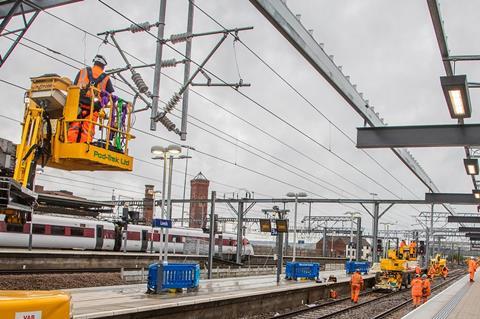
UK: The government has published its Integrated Rail Plan for the North & Midlands, setting out revised plans for High Speed 2, new and upgraded infrastructure on trans-Pennine routes, and projects including Midland Main Line electrification and reducing journey times on the East Coast Main Line which run to the 2040s.
Released on November 18, the production of the IRP is a result of the Oakervee Review of HS2 published in February 2020, which called for an further review to ensure that HS2, Northern Powerhouse Rail, Midlands Rail Hub and other major schemes were scoped, designed, delivered and operated as an integrated network. IRP takes into account value for money, the government’s ‘levelling up’ agenda, affordability and deliverability.
In the introduction to the IRP, Prime Minister Boris Johnson writes: ‘To most destinations, both from London and on the core Northern Powerhouse Route, this Plan delivers journey times which are the same as, similar to, or faster than the original HS2 and Leeds – Manchester proposals. It doubles or trebles capacity. It delivers similar or better value for money. And it starts bringing benefits for passengers far sooner than the previous plans.’
The plan is valued at £96·4bn at 2019 prices.
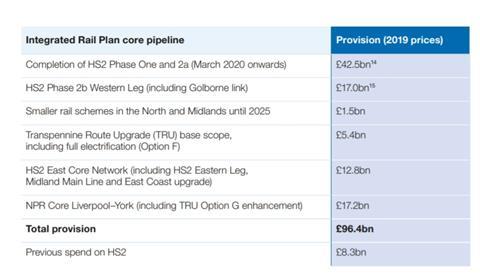
High speed lines
The Crewe – Manchester Phase 2b section of HS2 will be built, with new stations at Manchester Airport (subject to a local funding contribution) and Manchester Piccadilly for HS2 and NPR services. The government intends to continue developing Piccadilly as a terminus station adjacent to the existing trainshed, although it is intended to accommodate inter-city services running east-west across the Pennines as well as north-south via HS2.
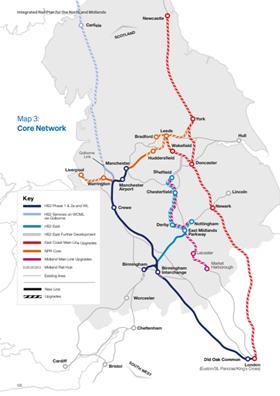
A cut-back eastern leg of HS2 will be built between Birmingham and East Midlands Parkway, with trains continuing to Nottingham, Derby and Sheffield on an electrified Midland Main Line. HS2 trains would serve Nottingham and Derby city centres directly, replacing a planned station serving a regeneration zone at Toton, located between the two. However, the previously proposed HS2 alignment north of East Midlands Parkway will be safeguarded.
Around 60 km of new high speed line is to be built in two sections between Warrington and Manchester Airport and Manchester and Marsden, east of the Standedge tunnels in Yorkshire, with trains using upgrading existing lines to serve Huddersfield and Leeds. Manchester – Leeds will take 33 min, 22 min faster than now, and Manchester – Liverpool 35 minutes, doubling capacity to Leeds and more than trebling capacity to Liverpool. Upgrading and electrification of the existing line between Leeds and Bradford Interchange via Bramley could give a non-stop journey time of 12 min
The cost of the NPR line is put at £22bn. The government said options for a fully new build high speed line were carefully studied ‘but would have made journeys between Leeds and Manchester only 4 min faster at a cost of an extra £18bn, and would have taken up to a decade longer to deliver’.
A further study will look at the most effective way to run HS2 trains to Leeds, including understanding the most optimal approach to station capacity.
Upgrading and electrification
IRP includes electrification of the Midland Main Line from Market Harborough to Leicester Nottingham, Derby and Sheffield.
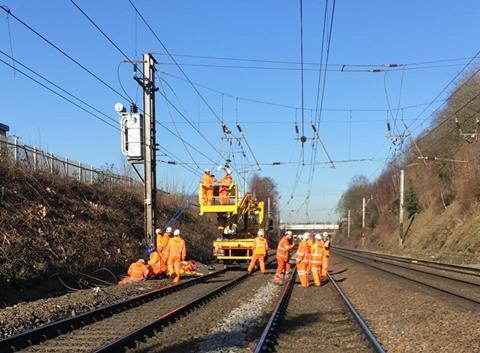
A programme of ‘rapid upgrades’ to the East Coast Main Line would increase maximum speeds to 225 km/h on some sections, improve station capacity, and remove bottlenecks such as flat junctions and crossings. This would cut London – Newcastle journeys by 21 min, London – Leeds by 20 min and London – Edinburgh by 42 min.
There will be full, rather than partial, electrification as part of the upgrade of the trans-Pennine route between Manchester, Leeds and York, which will now be managed as the first phase of NPR. Digital signalling and longer sections of three and four-tracking would enable a 20% increase in passenger services, and there will be improved clearances for freight. An additional £625m in new funding has been confirmed to progress the Transpennine Route Upgrade.
West Yorkshire mass transit
The government said the IRP would he free up of money to improve local services and integrate them with HS2 and NPR. This will include £100m of funding, with additional sums going to West Yorkshire Combined Authority, to plan and start building a mass transit system for Leeds and West Yorkshire. Tram and trolleybus schemes have come and gone in the past, but government said ‘we commit to supporting West Yorkshire Combined Authority over the long term to ensure that this time, it gets done’.
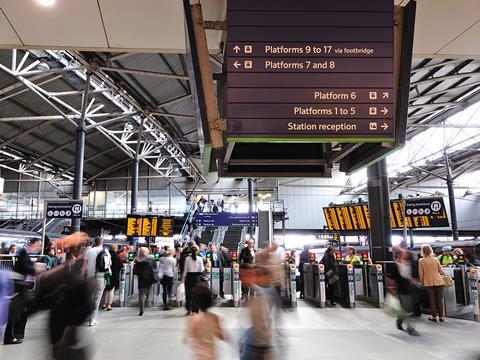
The cost for this network is expected to exceed £2bn over 10 years. There are inter-relationships between the mass transit system and the other schemes, particularly at Leeds station where it could free capacity by removing some local rail services, and so the projects will be co-ordinated.
The government said IRP would provided greater connectivity benefits between the West and East Midlands than previous plans, and it would progress work on options to complete the Midlands Rail Hub programme which would ‘dramatically’ increase local services through central Birmingham and across the Midlands.
There will be £360m of funding to deliver a three-year programme of fares, ticketing and retail reform including the roll-out of contactless pay-as-you-go ticketing at commuter stations with automatic best price billing. The government will also ‘drive towards’ rolling out digital ticketing across the whole network.
IRP is not a complete list of planned rail investments in the north and Midlands, and does not included separately-funded medium-term capacity improvements and reopening projects such as the Northumberland Line.
‘Faster and more efficient’
The government said the plans to use mixture of new-build high speed line and upgraded conventional lines were drawn up ‘after it became clear that the full HS2 and Northern Powerhouse Rail schemes as originally proposed would have cost up to £185bn and not entered service until the early to mid-2040s’. The revisions would ‘deliver better outcomes for passengers in a faster and more efficient way than under original plans’, it added.
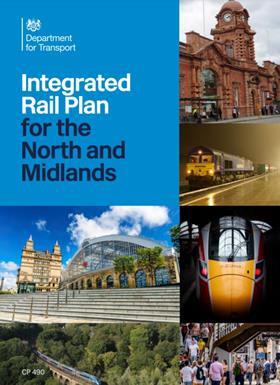
‘My mission is to level up opportunity across our country, which is why we’re making train journeys faster and more reliable through the biggest ever public investment in our rail network’, said Prime Minister Boris Johnson. ‘This is because better rail connections are essential for growing local economies and businesses, and our Integrated Rail Plan will deliver better services to more people, more quickly.
‘Levelling up has to be for everyone, not just the biggest cities. That’s why we will transform transport links between our biggest cities and smaller towns, ensuring we improve both long-distance and vital local services and enabling people to move more freely across the country wherever they are.’
Transport Secretary Grant Shapps added that ‘our plans go above and beyond the initial ambitions of HS2 and Northern Powerhouse Rail by delivering benefits for communities no matter their size, right across the north and Midlands, up to 10 to 15 years earlier.’



